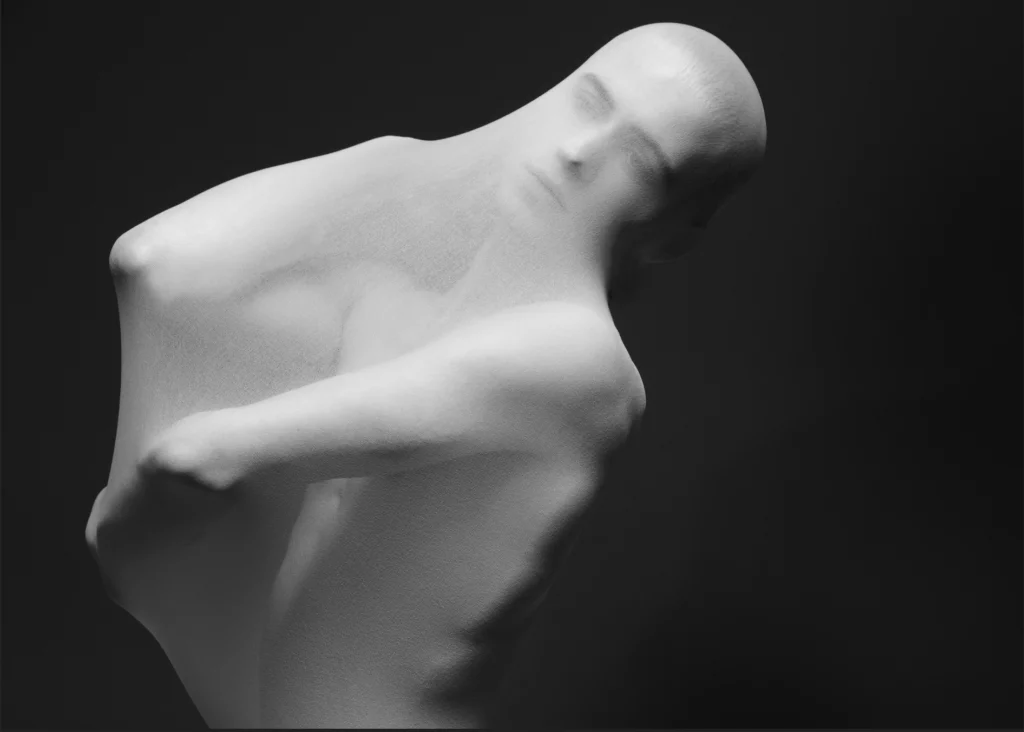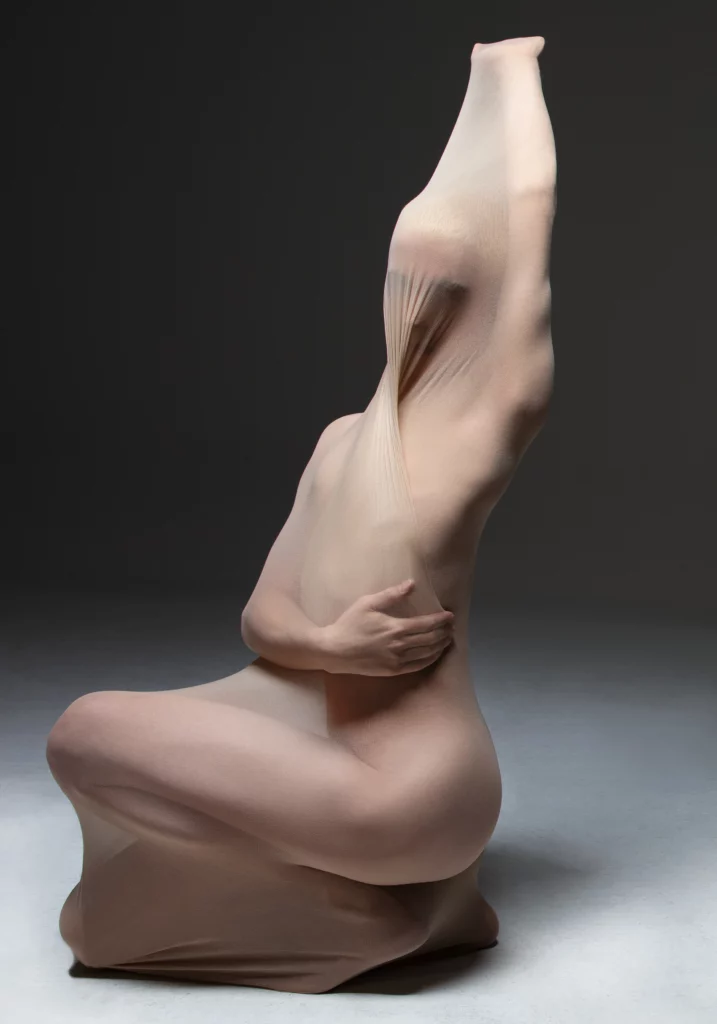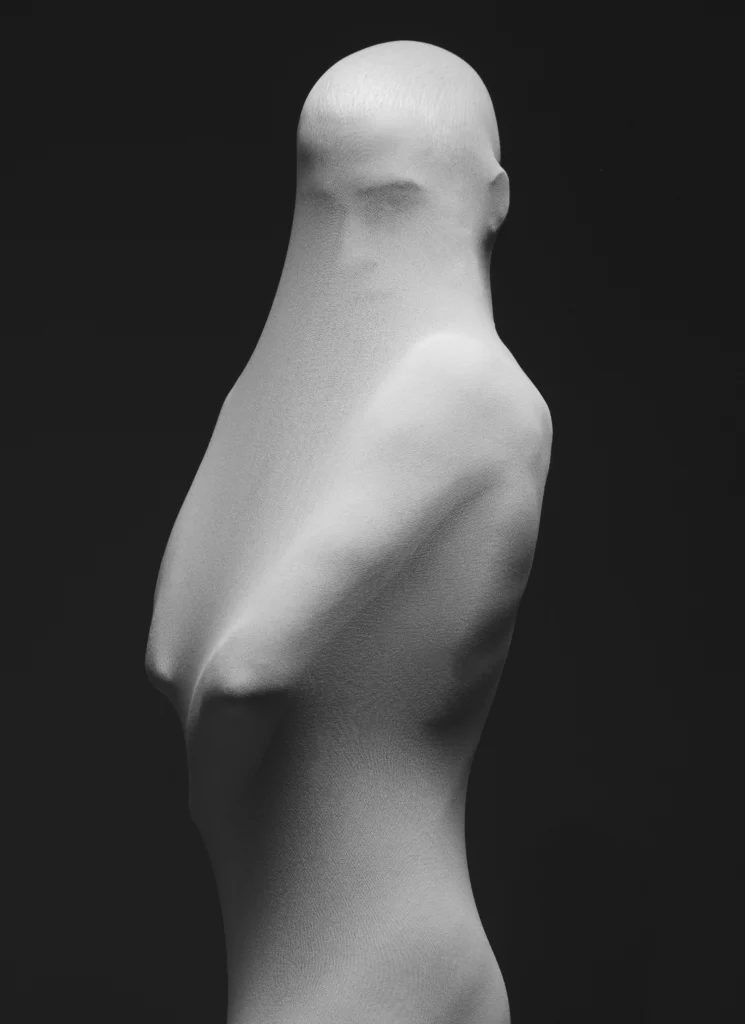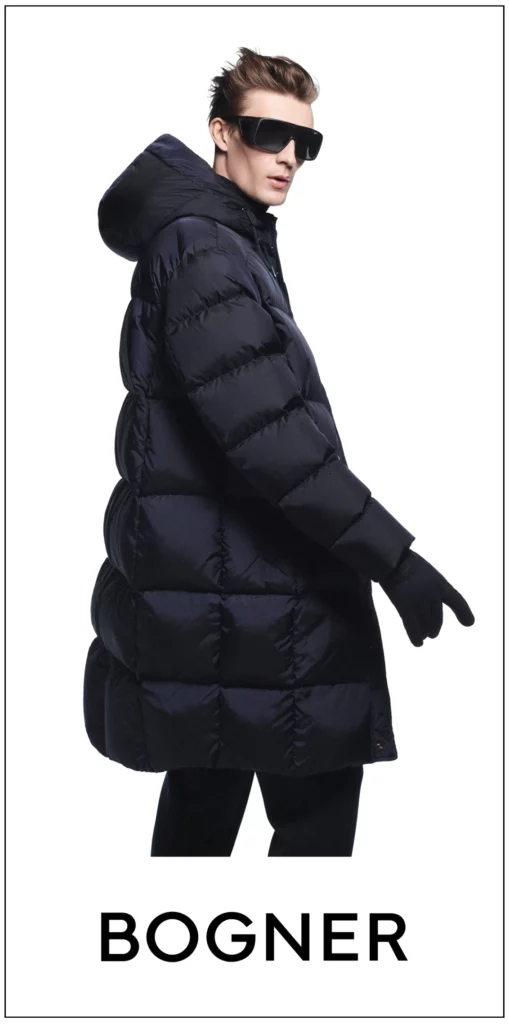Interview by Milan Vukmirovic

Griffin is one of the most creative and talented up-and-coming designers in New York City. In 2022, he released his first ever collection for his namesake brand -GRYPHYN. An amalgamation of vibes, including sensual lingerie, paired with sportswear and outerwear, his clothing collection is mainly made using Latex. So, it should come as no surprise that he has dressed the likes of fashion icon Julia Fox, Camila Cabello and singer-songwriter Cailin Russo. Inspired by Manhattan’s queer and punk nightlife scene, he recently expanded his not-so-classic collection by implementing more traditional fabrics like jersey and leather; hence the more accessible RTW everyday essentials like hoodies and tops. Not losing his signature style which incorporated strong silhouettes found in streetwear and motocross looks, he can’t help but infuse his cool and unique twist. Griffin, who can be considered a multi-talented artist and performer, sat down with Milan Vukmirovic to tell us more about his work throughout, and taking the readers back to his early years in the fashion game.
MV: Hi Griffin, we have noticed that you have done so many things and still you appear to be very young. May I ask how old you are?
G: Yes I am 25
MV: You are a multi-talented creative person – walk us through when that creative energy sparked for you?
G: Ever since I was a little kid, I remember making origami lamps, and I would even sell them after at an art fair. I would further my artistic expression by putting those pieces of paper on my body, and playing with them, too. Soon enough, I found myself sewing dresses with my mom’s sewing machine – and not knowing what a dart was, I was always trying to figure out how to maximize my overall final result.
MV: Did you know this would be your future?
G: Yeah, definitely. I just loved the strength that it gave me as a young queer boy , creating these little things in my room at night. I never was into video games but you could find me drawing, cutting and even making things out of clay.
MV: It’s interesting you are saying ‘young queer,’ because as we know that society at the moment has a tendency to want to define everybody. Following your social media for quite some time, and since we did this amazing shoot together, I was in fact surprised how sometimes you play with both sides of your personality. I found that you can be super boyish at times, and then others – very feminine. Would you say you are totally gender fluid even in the work you do as fashion designer, or it’s basically your personality ?
G: I never really wanted to be labeled. And when I first moved to New York City, I definitely expressed myself as a gay boy a lot more than I did when I was growing up. I think a lot of attention was casted on me and assumed that I was ‘this way’ or ‘that way’ – a non-binary gay, trans…. all this stuff. So, that sent me into this mindset of just trying to figure out what category I belonged in. And I went so far into this hole that I didn’t know who I was at the end of it all. Currently, I would say that I don’t really have a label besides ‘queer.’However, these days I’m going to be more androgynous. That is the plan.
MV: Were you bullied at school?
G: Yes. And I think my love for fashion was directly linked to my insecurities as a result of the way I was treated. I really never felt like a full human in my life…until fashion hit me in the face. Truth be told, it was a dream that could help me feel comfortable with who I am. At school I never was able to make friends fully and express myself because people didn’t really understand where my priorities remained. And what was considered normal among the other kids – well, being creative was my energy. My family also tried to change me and push me to do sports…my style was most certainly more circus focused for example being an acrobat or a contortionist was fun, but what really turned me on were the costumes and makeup, etc …
MV: Do you have siblings?
G: I have a brother who’s 18 months older than me, and we are completely different. He’s into sports and video games – basically everything that I was not.
MV: But I remember you told me you left home quite early, right?
G: I did. I left home at 17.
MV: you came to New York at 17 ?
G: yes I moved from Detroit to Manhattan.
MV: That must have been quite an exciting and liberating change…
G: It was amazing. It felt like everything that I was. I was hosting gigs and I was in drag every night. It was like my identity kind of changed faster than my own understanding of myself. I became really feminine because of how people perceived me. Then I went really masculine. Then I had this feeling that I was like, ‘oh wait, maybe no, I’m just overcompensating because I’m insecure?’
And then I asked myself, ‘maybe I’m like non-binary or maybe I’m they, she, or maybe I’m he, they, or maybe I’m just they, or maybe I’m just it!’
MV: But you were all by yourself so wasn’t it scary and confusing? Nightlife can be dangerous with all the temptations like drugs and alcohol, plus manipulative people. And you were very young, and no one to really advise you or protect you so I guess you were completely by yourself?
G: I was. I was the kid in New York who had to survive and could go out to clubs. So I had to get jobs, and I had to do this, and that…but I had such a passion for fashion which sounds so tacky so I decided to do internships with stylists or assist makeup artists. And you know, as expected, many people took advantage of me along the way.
MV: Funnily enough, I first discovered your work on social media not through your fashion designs but your amazing special effect body make up skills. That’s an extraordinary talent that requires a lot of knowledge. The technical aspect of it is very far from making clothing. And it’s also something that is very creative. So how did you end up doing this?
G: Well, I’m a Scorpio and my birthday is near Halloween. I love scary movies and their characters. So I would work on special effects makeup all throughout haunted houses, like costumes and fur suits. So when I moved to New York, I wanted to became a special effects makeup artist.
MV: How did you learn ?
G: I learned through high-school, both on my own and through other people, but mostly just YouTube. And then I moved here and kind of had an even better knowledge of it and was able to do a lot of projects and meet more people here who specialized in special effects.
MV: In a way your love for latex that we can see through your fashion collection, is in a way connect to your make up skills. latex is like a second skin .
G:Yes. I did my first latex clothing piece few years ago, I wanted to extend the idea of a prosthetic toity mm-hmm and I had a flash realizing latex has this feeling And Yes like a second skin, it had so much emotional meaning to me because I used fashion as a defense and as an armor instead of something that I was confidently putting on, I was actually very insecure and putting on to be more confident mm-hmm and now growing up, I’m getting out of that and I’m being less visually expressive personally, and just channeling that in my art.
And that feels really healthy for me now.
MV: But do you know where this passion or obsession for skin is coming from?
G: Definitely as I’ve always been really attracted to the body and even as a young child just being a contortionist and in the circus and stretching my body and working my body and using it for dance….and then the idea of fashion, and then my own insecurities, I just felt like being naked was kind of the Griffin way of dealing with, you know, by itself and myself.
.
MV: Second skin reminds me to also think about some animal species l who are shedding their skin. So in a way, what you were saying about your personality or your sexuality, you are like an animal in constant metamorphosis…
G: We can change skin very often metaphorically for ourselves. And who we are and what we represent at a moment in time, but everything’s like really temporary and latex itself is temporary. Plus it is 100% biodegradable and there’s this element of like ephemerality to all of it.
MV: Latex also has a very sexual connotation, too. Is sexuality important in your work?
G: Yes but I’m just trying to pair that down and recontextualize sexuality. So it shows a little bit more than just blatant, you know, fetish wear…. and different things. Because at the end of the day, I don’t even think about the sexual elements of my clothing because it’s in my DNA and it’s so clearly obvious about where it’s past lies in the fetish community and all this stuff. With all of the available technologies today, you can also create any shade of Latex. The evolution is fierce and although I want to get involved now, I just can’t. But when I have a budget and when I have everything aligned, I want to create creature-esque zoo suits – like full suits, but in gowns and in fashionable clothing, kind of like I would be taking another anatomy form.
MV: Do you consider your collections being totally Unisex ?
G :Yeah, 100%. I do. I really think fashion is still barely unisex and I am kind of like a very anti-fashion type of person. I like to push boundaries.
MV: Why would you say anti fashion when I know you have a real passion for fashion ? What’s the part that you don’t like?
G: I didn’t go to school and I had horrible grades in high-school. Sometimes I just feel like the industry has never really fully accepted me because I am not accredited. And I am not sure I will ever be. The industry in general doesn’t have a structure that always works for people who are very very different like me and truth be told, it’s not an easy industry to access and it’s just a hard industry to live in.
MV: I hear you, but sometimes you have to see it as a chance because being different is a chance that you should embrace. Being recognized for it and celebrated is the difficult part, but it’s worth it. Your difference is what makes you special.
G:Yes I guess I need to figure out how to make it work for myself. Fashion is what I imagine still doing in twenty years from now anyway.
MV: Is it not more easy for your generation than it was 20 – 30 years ago. The digital world and all its platforms can help you be more visible, more free and even sell directly to your followers and clients? In my own career, when I was your age, you had to go through press and journalists approval, and you had to be in magazines to find showrooms to sell your collections …Fashion was much more for the elite. Today everything is more democratic approval of the press and journalists are not prevalent. I mean, you know, it was very, it was much more filtered and it was really for a certain level of society. Now it’s much more accessible, don’t you think ?
G: I would say, I would say to be seen as a fashion brand and to be seen in the light that the traditional fashion industry sees as a brand…. there’s no respect given these days, any influencer can easily drum up a collection. That’s not fashion, so for me to be using all of the resources that a lot of my peers use, like TikTok and like Instagram and all these things, it works. But only to a certain degree. And then you push that line and I’ve been thinking about my perception and what I choose to post and how restricted I am and how I compare myself to people who are already really successful. And there’s like, I see benefits in both. Like, I think that there is a benefit to like really under utilizing fashion.

MV: When we first met and talked over the phone, you and I discovered we both had a common passion for Alexander McQueen. You didn’t really know me or my work until you realized that in the past I did a photo shoot with Elise Crombez wearing couture McQueen and that some of those pictures were a big source of inspiration for you…
G: OMG yesI had for years a notebook with things that were inspiring the most yes, and Elise and you and McQueen were in it!
MV: Not only have I photographed his clothes but I had the chance to sit down with him once and interview him for l’Officiel Hommes Paris. And McQueen was really an artist and even more than just a fashion designer. He was suffering a lot also with the fashion game and the business part of it as he was a real free spirit. And even if now everybody talks about him like a genius, he wasn’t always well treated by some editors. To me you are also a multi-talent artist and you design clothes, but you also have created jewelry and furniture. Lastly, you are a genius make-up artist, too. And this is more and more rare especially in this time of fashion where there is a lot of emptiness based on celebrities. Does it sometimes pull you down ?
G: Many days I have felt like quitting. But fashion and my work are my love and passion so I won’t give up because I sacrificed way too much of my life for this.
MV: Another part of you that I like is that you are a real performer on top of all the rest. Did that come from your circus experiences or your nightlife in NY ?
G: Both, but also fashion and more particularly fashion shows have something very theatrical to them. We talked about Alexander McQueen and his shows were also spectacular. But yes I love, love, performance art, as expected.
MV: There are so many creative aspects in your personality so what excites you the most?
G: All of it , but to be completely honest, I’ve found joy in creative directing in these past three years since I met you.
MV: Really ? thats a nice thing to hear!
G: I’ve realized the true joy that I find is seeing my vision come to life with so many other creatives. And elaborating on things that, you know, it feels as if I’m doing this with my neighbor and my friends and the people I go out with so its extremely organic.

MV: But this can also be very consuming. Do you protect yourself ? Fashion is marvelous but at times dangerous for a creative mind. It requires so much energy, and mentally it can be very challenging. McQueen was a genius but there was also a darkness in his work and mind…
G: You know, 2022 for me was a testament to that. I realized that you can have it all and you can be desired and you can finally be liked by Griffin, but you will not fully be respected. And that’s what I learned that year. I had a lot of designs that I created stolen from me by big, big companies. And it really affected me so much that I wanted to quit again. And this was after amazing good things had happened, too. I also realized that wealthy corporations can manipulate you, even when you have a lawyer.
MV: Well I do love your work so much and I like you that you didn’t choose the easy way. I saw how passionate and hard working you have been and noticed that you put all your heart and soul into your art. You can be as powerful as you are vulnerable. Your work is very emotional and I think it’s brave. And more than success, what motivates you is creation?
G: You know, when you just get so hungry because you have this idea in your brain, it’s been festering and you just like, feel so much pain because it’s not out and it’s like late night and like all these different things and you just are very passionate about. I do remember you telling me ‘’ just take it easy’’. And it’s funny because I did not take that advice.
I’ve gotten more allergic to latex also recently.,The more I take on work the worse it’s getting for my body, um, realizing that right now, especially after this year, which has been the most successful year of my life so far. Not easy to find a balance between passion and stress.
MV: I will add something though. America is not the easiest country for very creative fashion designers. The industry is even more ruled by the numbers, the merchandising, the marketing…Dont you think Europe will suit you best ? The fashion culture is different there. It is a business too but we value differences of creativity more…
G: Yeah. Definitely. It’s most certainly difficult here in the USA. The NYC scene, to make it, you need to be connected to celebrities and the red carpet crew. And as much as you need to be seen and get fame, then you need to make numbers for the masses. That’s a real struggle here. It’s how much you are ready to compromise and play the game without losing your soul.
MV: There are many creative people here in the US and in Europe. But honestly not so many are really talented in the American fashion industry. You are an exception and have a unique voice and you should never sell it. We will help you as much as we can. But thus far I am pleased with what we did together and I feel lucky to have met you.
G: No, thank you. This was one of the coolest experiences of my life to be there and to do this. And I haven’t even seen the images yet. I’m just… I’m over the moon. I can’t wait.

